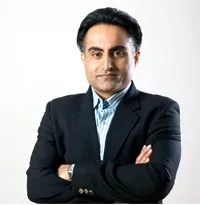Avnish Bajaj, Matrix Partners: "There is a huge market available for 'made-for-India' type of business ideas today."
Wednesday June 20, 2012 , 14 min Read

Baazee grew into a healthy business acquiring a couple of competitors along the way, in spite of the turbulent market at the time. Eventually, it was sold to eBay in 2004 for USD 55 million and Avnish continued to run eBay India for a year and a half. He later moved to venture capital (VC) investing through Matrix Partners.
In this interaction with YourStory.in, Avnish recounts some of the lessons he learnt as an entrepreneur, provides insights into the ebb and flow of the e-commerce industry and speaks about what VCs are looking for, all while continually reaffirming his faith in the exponential growth rates of the domestic Indian market. Do read on to know more.
After Harvard Business School and working with companies like Apple and Goldman Sachs, what was the trigger for you to come back to India and start an Internet venture here?
To state it as it was, I could say that I was carried away by the dot com bubble. I was in one of the top investment banks of the world and it was one of the best times to be an investment banker. There was a lot of wealth creation happening around me. But I had always wanted to be an entrepreneur and I had always wanted to be in India. So while I was at Harvard in 1997, I visited India to do a field study and explore the idea of starting an IT services firm here. At that time, I realized that it was not something that excited me. It seemed to me that it was a visa management business more than anything else, as most of it was about onshore services and taking people from here to there. It helped me understand that my passion didn’t lay there.
As a result, I went to Goldman Sachs and that was a big move as I saw the wealth creation in the technology industry and I got carried away. I thought that it was the perfect time to come to India and start a company, frankly without doing enough research. When I came here, I realized that there weren’t any players in the Internet space in India and that it was not the right time to start an Internet venture here.
But there was always the passion to be an entrepreneur and the goal was always to be back in India. However, the actual circumstances that led this to happen were more irrational, driven by exuberance and not very well thought through.
As one of the earliest players who made it big in the market, how have you seen the e-commerce ecosystem evolve over the years?
We were talking about exuberance, right? If you use exuberance as a word, then there have been three defining phases, with respect to e-commerce. The first phase was 1999 - 2000. The second phase was 2006 - 2007. And the third was 2010 - 2011.
In 1999 - 2000, even the global companies didn’t know what worked or what didn’t. In India, we didn’t have any Internet users and on top of that, there was crazy venture investing and some totally crazy valuations for Internet businesses in the West, which was the worst of all possible combinations. In 2006 - 2007, global companies figured out what worked and in India, people thought that they could make the knock-offs of the global companies' work.
After looking at China, people were speaking about how India would have its own search engine like, let's say, Guruji or how it would have its own social network etc. What we were not understanding at that point was that, essentially, we were an English speaking country. There was no reason for a local company to win over an existing MNC. And again, there was a lot of chasing of the big bucks and this time around, there were more Internet users. However, in 2006 - 2007, the valuations didn’t go crazy.
In 2010 - 2011, I would argue that, finally, we had reached a critical mass in terms of Internet usage. There are users. But again, this time, the exuberance has gone out of control. Now, people have again started assuming that India has become like China and that our market can grow as much as China. Therefore, they have pumped in a lot of money under crazy valuations. And the bubble has burst, at one level. Now, the valuations are getting corrected and people are thinking differently. A lot of companies have taken cuts of 30 - 80% in their expectations.
The big difference is that there is a market, there are Internet users and a lot of Internet businesses are going to get created in the next 3 - 7 years, which was hard to predict in the previous cycles. The problem has always been the investors and what they have done to the sector, rather than any fundamental mistakes committed by the entrepreneurs.
This time around, I feel that the sector is fundamentally in very good shape and that we will see a lot of good businesses coming up. Yes, there are going to be investors who will still lose money, as they got carried away initially. But essentially, the ecosystem is now strong.
What, according to you, are the major challenges faced by the e-commerce industry today?
Payment issues are still there and most people end up using Cash-on-Delivery (COD). For the consumer, COD might be a great option. But for the companies, it is a very bad option, as the returns are very high, the costs are too steep, and many of the logistic networks, except for one or two companies, are not very reliable.
So, if you looked at the friction points initially, the Internet speeds used to be very slow and getting to a website, searching for a product, finding the product required at a price that was reasonable, etc. used to be major concerns. That is no longer valid. But everything beyond that are still friction points - to make a payment online v/s offline, the payment modes, the delivery, figuring out replacement and returns, the back-end of the user experience, etc.
And it is not always the fault of just the Internet companies. We all know what the state of our infrastructure is, in general. It is a ramification of what we see on a day-to-day basis in our life. Supply chain is also a big issue. In addition, with regards to e-commerce companies that are trying to work with a number of vendors and considering that we have never had large-scale organized retail in our country, a lot of the vendors don’t have sophisticated inventory management systems. This makes it very difficult for an e-commerce company to scale if their back-end supplier systems are all going to be in, let's say, Excel sheets. So, that is another challenge.
What are your biggest learnings from the Baazee journey?
More than anything else, I have learnt that the best product ultimately wins. Now, that sounds obvious and you could say that this has been proven by Google, Facebook and Apple. But if you notice, none of these companies started out as great marketing machines. They have succeeded largely on the basis of creating world-class products.
When we started Baazee, we used to spend a lot of time on marketing and PR. We were not spending as much time thinking about what would count as a world-class user experience, despite our product for the buyer or seller on the site being all about user experience. For the first two years, we did everything but that. And for the next two years, we did nothing other than that. The very moment we shifted our focus and said this has to be the best in its class, things changed. I believe that consumer businesses, or for that matter any business, gets rewarded disproportionately when they focus on their core product and do an excellent job at it.
And I think, somewhat relatedly, focus is very important. If you look at the biggest companies in the world, GE maybe being an exception, most of the highly valuable companies in the world do one or two things really well. Google does search really well. Facebook does social networking really well. Apple originally did the iPod and then, the iPhone really well.
If you look at Apple, most of their profits come from iPhone sales. If you look at Exxon Mobil, they do oil really well. So my view is that you have to excel at something and that the companies which excel usually focus on one or two things. Often, successful and talented entrepreneurs, especially in India, have a tendency to diversify. They want to do 15 - 20 things. If you look at some of the best companies in India, they are in 15 - 20 businesses. They may try and do everything. But if you actually look at how they end up being successful, it usually comes down to one activity.
So, if I were to put it in the form of a mantra, I'd say this - stick to your core, do an excellent job of your core, and resist the temptation of diverting from your core.
After Baazee, why did you choose to go down the path of venture capital?
(laughing) Because entrepreneurship requires too much work! I thought about it a lot and I must say that it was not a fully planned strategy. What happened was that, after Baazee, I started angel investing. I invested in all kinds of businesses. I invested in a travel company, a biotech company, a legal knowledge process outsourcing company, a digital marketing company, a real-estate development company and then, a few more. I had made about 7 - 8 investments and I realized that investing gave me the opportunity to participate in various types of businesses.
So, the depth in entrepreneurship is a lot more, in the sense that you have to really dive deep into one domain. But the breadth in investing is a lot more and having been an entrepreneur myself and having done the deep dive, I wanted, in that stage of my life, to get more of a breadth experience.
Are there any specific sectors that really excite you when it comes to investing in India currently?
So, as a firm, Matrix focuses on Internet, Mobile, Healthcare, Education and Consumer Services. We are betting big on the domestic Indian market. We don’t invest in outsourcing services, export services, product companies from outside, etc. We are very focused on the Indian market.
How many companies do you plan to invest in, in 2012?
We raised a fund last year. But we haven’t deployed much of it. So, we have a lot of investing to do. However, we don’t set targets because we believe that we make the wrong decisions when we are forced to do a certain number of deals within a short period of time. Matrix’s target is to make a few high-quality investments. We are not a bulk investor. For instance, you won’t find us in any of those investment rankings. Perhaps, we will make 4 - 6 investments this year.
Many VCs complain that there are not enough investable companies in India. What are your views on that?
In general, I don’t disagree. I do feel that there is an overhang of capital in the sense of VCs looking to invest in India versus the availability of quality investment opportunities. However, at Matrix, our approach is not to wait for good investment opportunities to knock at our door. We typically take the approach of saying that we like a particular sector and we try to find sub-sectors that are of interest. Then, we go and look for companies ourselves and even if they don’t need investment, we try to convince them. With that approach, we meet a lot of interesting companies.
You talked about Education and Healthcare being some of the sectors that excite you. Do you see any interesting trends emerging there?
So, if you look at education, the trend is that it is going to be moving towards more for-profit models. Overall, for the country to facilitate education to the masses, the Government has to regularize for-profit private education over a period of time and I think that will be the trend.
In Healthcare again, I feel that there is a demand-supply imbalance. We have invested in one of the speciality Healthcare services firms. We have an eye care chain on our portfolio. We also have Cloud9, which is a maternity chain. I think what people are increasingly realizing is that if they go to most of these private hospitals, there are really long waiting times.
When my wife delivered our second child a year ago, we had to sign up at a hospital in Breach Candy in Mumbai, seven months in advance. I think people are getting irritated with all that. So, in my eyes, Speciality Healthcare services are going to be big. For instance, people expect, especially in cases where things are not critical, like maternity to be a joyous experience. In some of these things, people expect a hospitality experience as opposed to a hospital experience. And I believe that it is a large untapped market.
Which are the e-commerce companies that, according to you, will do well going forward?
I think Flipkart is clearly a winner. I think they have done a great job from day one. I am not so sure about almost everybody else. When it comes to a lot of the vertical-focused e-commerce sites, I am not sure whether there is enough depth in the market to support that kind of stuff. So, everything else is a question mark for me. That said, we are an investor in one of the e-commerce sites. The investment hasn't been disclosed yet. So, my view is that taking a narrow, targeted approach and building a business model based on high-decibel marketing doesn’t work. We are taking a very conservative approach. So while I am a big believer in the potential of the Internet and e-commerce, I am not a big believer of the VC approach to e-commerce in India.
Usually, we ask this question to entrepreneurs. But, as a VC in India, what are your challenges?
I think the challenges are changing for VCs. Initially, it was about finding enough risk-taking talented people. I think that has changed. And I think the good bit about all this valuation hype is that people do get attracted to such sectors and for us, it becomes easier when more talented people are going after it.
What I feel is that, and it is ironic that it is coming from me considering how even my idea was one that was copied, we in India quickly do knock-offs. But we don’t do anything original. So, post Groupon, there were 400 group buying sites in no time. I think Internet in India has become synonymous to e-commerce, at least in the last two years. But really, it extends well beyond e-commerce. If you look at the biggest value creation vehicle created in the last decade, it is not Groupon. It is Facebook. It’s Google. It’s Zynga. It’s Twitter. It’s LinkedIn. Where are all those ideas?
I am not saying that these business models need to be re-done here, as we are an English speaking Internet population. So, we can effectively use the same products. But I have not seen many made-in-India-and-made-for-India kind of businesses, which I think there is a huge market for. What we are seeing is knock-off after knock-off after knock-off. Now, I can give you an example of made-in-India-and-made-for-India products which I personally don’t believe will work. But there are people who believe it will. Lately, people are talking about all these car rental and taxi businesses. Whether I believe it will work or not is secondary. But I would like to see a lot of those. So, that is my biggest challenge. If people were to do this local kind of thing, they will be surprised with the kind of support they can get from investors.
We thank Avnish for his time and valuable insights. What are your thoughts on this story?
You'll find more on Matrix, here.








![[Funding alert] Alternative credit platform BlackSoil raises Rs 32Cr via NCDs](https://images.yourstory.com/cs/2/3fb20ae02dc911e9af58c17e6cc3d915/Ankurimage-1600856808384.jpeg)
![[Funding alert] Blue Tokai Coffee Roasters raises Rs 17 Cr led by Anicut Angel Fund](https://images.yourstory.com/cs/2/b87effd06a6611e9ad333f8a4777438f/Image39y3-1628672264157.jpg)
